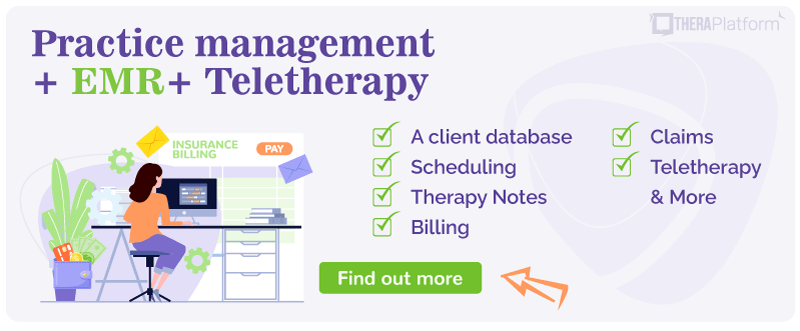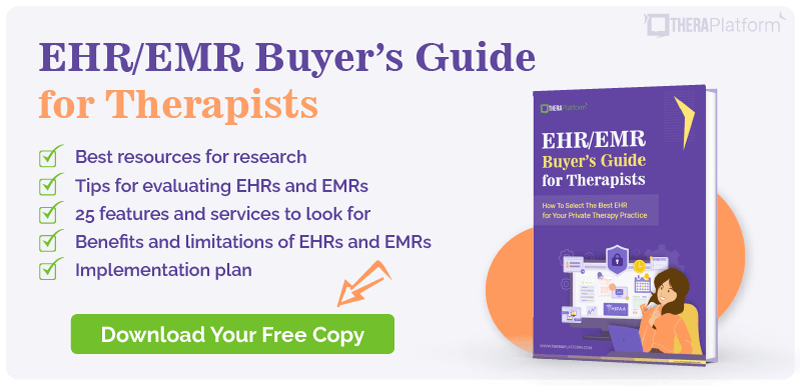EHR vs EMR

EHR vs EMR. As a therapist, you probably have heard the terms electronic medical records (EMRs) and electronic health records (EHRs) and wonder how they’re different. Some providers and clients may use the two names interchangeably and not even realize that there is a difference. Understanding the difference between an EHR vs EMR can you help make a better decision about what you would like to implement in your practice.
What are the differences between an EHR vs EMR?
Both EHRs and EMRs provide digital versions of client records. They provide a space to securely store all the information that you would collect from your client, the documentation you create, and other information related to your client.
EHRs vs EMRs differ in the features and capabilities of each type of program. The names tell it all. An EMR is an electronic MEDICAL record. It houses the medical record of the client electronically. An EHR is an electronic HEALTH record. It electronically maintains all the information related to the client’s health. An EHR is not just limited to the medical record in the practice.
EHRs have features and capabilities beyond keeping the medical record of the client. They can easily and securely share client information with approved providers outside of the practice. With an EMR, you would most likely need to print out the information and fax or mail it to another provider.
EHRs typically offer additional tools and services to simplify the treatment and services you provide your client. Typically, an EHR functions as a practice management system whereas an EMR is limited to a digital version of a chart.
Start My Free Trial
Benefits of using an EHR vs EMR for clinicians
While some therapists continue to handwrite documentation and maintain paper charts, most clinicians have made the choice to switch to a digital version of documentation and record management. If you are ready to move away from paper charting and paper records, then selecting either an EHR vs EMR will help you to do so.
An electronic medical record offers many advantages for a clinician:
- Provides a digital secure software to create documentation related to your client (ex: session notes, treatment plans, assessments, discharge summaries)
- Saves time on creating, filing, and maintaining paper records
- Reduces the need for storage of paper records which can save the practice money
- Reduces the time and need for staff to maintain paper records (which allows you to focus more time on creating income for the practice vs. paying someone, or spending your time, on records management)
- Decreases the risk of documentation errors, losing paperwork, and breaches of confidentiality
- Easier to duplicate information related to the client across forms without having to write and recreate the same information multiple times
- Removes the barrier of having to read and decipher handwritten documents
- Simplifies the process of tracking, measuring, and assessing the client’s progress in treatment
- Can improve the continuity of care by providing reminders about due dates and other important information
EHRs offer these benefits of an EMR plus others. In addition to making it easier to share client information with other approved providers, many electronic health record programs also provide benefits related to the management of the practice. The EHR with practice management features can help your practice run more efficiently, save you time, and improve your treatment outcomes.
Typically, the EHR with a practice management system will include a patient portal.
The patient portal usually offers tools such as:
- A secure messaging system between clients and therapists
- An easy and secure way to send clients necessary paperwork
- Clients can complete the paperwork and electronically submit signed documents
- A safe way to store credit card information and collect payment for each session
An EHR with a practice management system may also offer other benefits such as:
- Online appointment scheduling
- Appointment reminders
- HIPAA-approved telehealth platform
- Worksheets and other types of homework and tools for clients
- Billing and claims options
- Secure messaging within your practice with other providers and staff
- Clinical training courses, blogs, and other learning experiences
When it comes to EHR vs EMR, think of the EHR as the system and the EMR as a piece in that system.
Limitations of using an EHR vs EMR
While most of the time, EHRs and EMRs will help to improve the efficiency of your practice, they do present a few limitations and challenges.
- The financial cost for the software (usually a monthly subscription fee or an outright purchase of the software)
- Time to train and learn the programs
- Requirements to connect to the internet to operate the software
- Risks of cybersecurity breaches
- Anxiety from staff or clients regarding using the technology
- Any software, server, or technology issues that arise can interfere with the functioning of the program
- May require the assistance of a technology professional to install the software, train, or resolve any problems
EHRs vs EMRs is a matter of record vs functionality. Understanding the differences between the two can help you make informed decisions about how to start and manage your practice and find the best solution for your practice’s needs.
Start 30-day Free Trial and explore TheraPlatform. HIPAA Compliant Video and Practice Management Software for Therapists.
Resources
TheraPlatform is an all-in-one EHR, practice management and teletherapy tool designed for clinicians to use in private practice.
TheraPlatform features:
- Online documentation
- Scheduling
- Client portal
- Billing and invoicing
- Insurance claims submission
- Telehealth with teaching aids
- Video courses to assist you with your practice management
TheraPlatform, an all-in-one EHR, practice management and teletherapy tool was built for therapists to help them save time on admin tasks. TheraPlatform provides affordable pricing packages and a free, 30-day trial with no credit card required. Cancel anytime.
Sources
The Office of the National Coordinator for Health Information Technology. “What Are the Differences Between Electronic Medical Records, Electronic Health Records and Personal Records: Frequently Asked Questions.” Accessed February 6, 2023.





